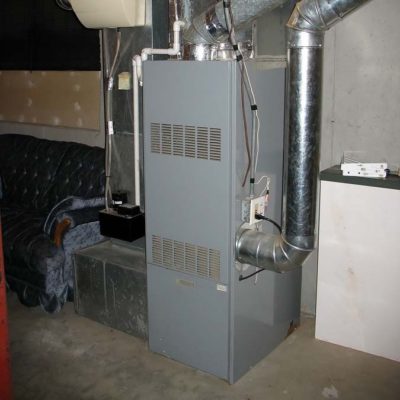The furnace is an essential component of a heating, ventilation and cooling system (HVAC) system.
As you may know, it’s responsible for creating warm air, which is circulated throughout your home via a blower motor and ventilation ducts.
While all furnaces serve as central heating units, though, some of them use different fuel than others. For residential HVAC systems, most furnaces are powered by either natural gas or electricity.
What Is a Natural Gas Furnace?
A natural gas furnace is a central heating component that burns natural gas to produce heat.
It features a pilot light that, when activated, produces a controlled flame. The natural gas furnace will then feed natural gas into a combustion chamber where it’s burned. As air travels through the connected heat exchanger, it’s warmed.
What Is an Electric Furnace?
An electric furnace, on the other hand, is a central heating component that uses electricity to produce heat.
Rather than using a pilot light, electric furnaces use an electric arc. Cold air is drawn into the electric furnace through the return vents, at which point it’s heated with the electric arc before being pushed through the heat exchanger.
Benefits of Natural Gas Furnaces
When compared to electric furnaces, natural gas furnaces typically cost less to operate.
Depending on energy rates in your region, you may save up to 30% on your home’s heating bills during the winter when using a natural gas furnace as opposed to an electric furnace.
Natural gas furnaces typically have greater heating power than their electric counterparts.
If you live in a region with brutally cold winters, you may want to choose a natural gas furnace for this reason.
Benefits of Electric Furnaces
While natural gas furnaces cost less to operate, electric furnaces are typically cheaper to purchase.
A new natural gas furnace may cost $2,000 to $3,000, whereas an electric furnace may cost just $500 to $1,500.
Furthermore, electric furnaces are easier to install.
All homes have electricity, but not all homes have natural gas. As a result, you can rest assured knowing that your home will support an electric furnace.
Electric furnaces are also quieter than natural gas furnaces.
Natural gas furnaces are somewhat noisy. All furnaces will produce some noise during operation, but electric models are typically quieter.
Finally, electric furnaces tend to last longer than natural gas furnaces.
It’s not uncommon for electric furnaces to offer up to 30 years of use, whereas natural gas furnaces have an average lifespan of about 20 years.
If you are experiencing a problem with your air conditioning or heating call us at 512-336-1431 to schedule an appointment. We’ll be glad to come out and take a look at the issue.
1431-183 A/C & Heating proudly serves Round Rock, Georgetown, Cedar Park, Pflugerville, Leander, Liberty Hill, and North Austin.

